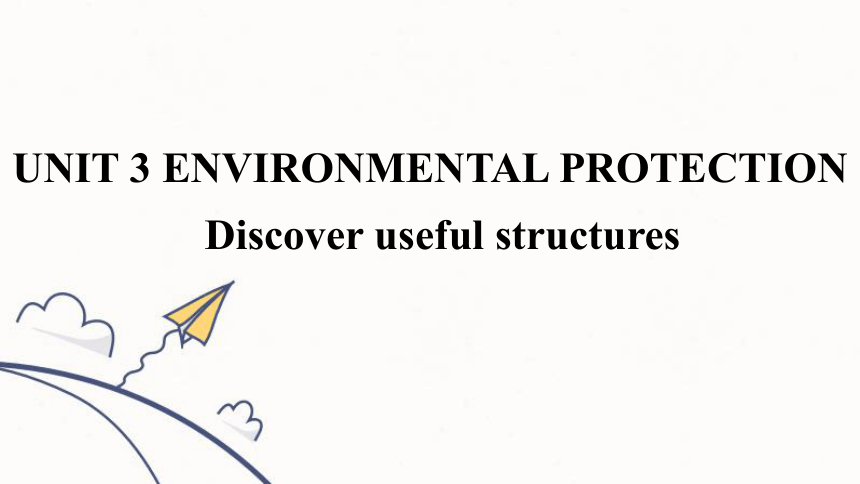(
课件网) UNIT 3 ENVIRONMENTAL PROTECTION Discover useful structures To analyze the difference in uses and meanings of direct speech and indirect speech. To practice transforming direct speech and indirect speech. Learning objectives Look at the sentences in both columns and discuss the differences between each pair. Summarize the rules for changing direct speech into indirect speech. The expert said that from the position of its dead body, the bear appeared to have starved and died. The expert said, “From the position of its dead body, the bear appeared to have starved and died.” Direct Speech Indirect Speech The reporter asked, “Will polar bears die out because of climate change ” The reporter asked whether polar bears would die out because of climate change. Direct Speech Indirect Speech The reporter asked, “How can we save polar bears from extinction ” The reporter asked how we could save polar bears from extinction. Direct Speech Indirect Speech “Let’s work together to stop climate change,” the expert said. The expert advised us to work together to stop climate change. Direct Speech Indirect Speech Read more sentences and answer the questions. 1. I’m still working because there is a lot to do. He said that he was still working because there was a lot to do. 2. Eleven thousand people live here and six thousand left last week. He said that eleven thousand people lived there and six thousand had left the week before. 3. Does this mean that the danger is over He asked if this meant that the danger was over. 4. They can’t go back to their houses. He said that they couldn’t go back to their houses. 5. When will people be able to return home The reporter asked when people would be able to return home. 1. What are the tense changes in indirect speech Present simple becomes past tense; Present continuous becomes past continuous; Past simple remains past simple or becomes past perfect; Present perfect becomes past perfect. 2. Which other words change Time phrases. 3. What word is added when a yes/no question is reported If. 直接引语和间接引语 引述某人的话可采用两种形式:一种是直接引语,即原封不动地引用原话,将其放在引号内;另一种是间接引语,即用自己的话加以转述,被转述的内容不放在引号内。 陈述句→由that引导的宾语从句,引述动词通常用ask, tell等; 如果直接引语讲的是客观事实或真理,变为间接引语时,时态不变。 eg The teacher said to us, “Light travels faster than sound.” →The teacher told us that light travels faster than sound. 一般疑问句→由连词whether或if引导的宾语从句,其主句谓语动词常用ask, wonder, want to know等。 eg Mother asked me, “Have you finished your homework ” →Mother asked me whether/if I had finished my homework. 选择疑问句→由whether ... or引导的宾语从句。 eg “Are you going to Beijing or Shanghai for the holidays ” she asked. →She asked me whether I was going to Beijing or Shanghai for the holidays. 反意疑问句→由连词whether或if引导的宾语从句。 eg “You don’t like ... ...

